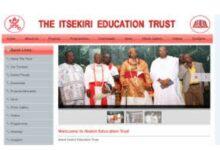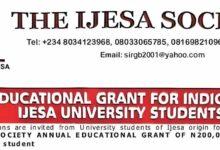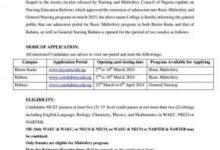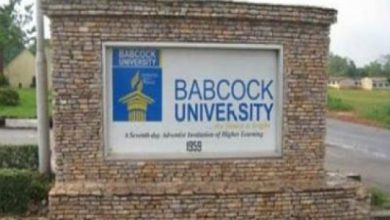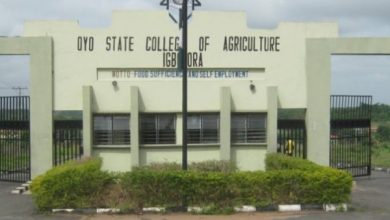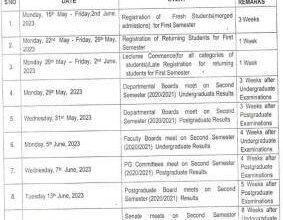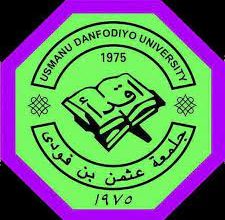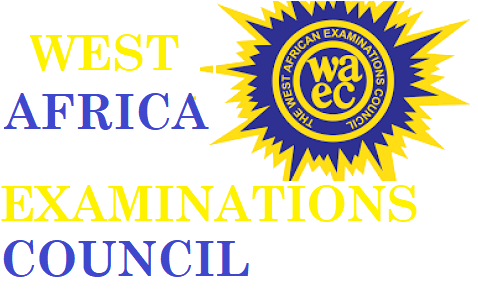
WAEC Syllabus for Government
WAEC Syllabus for Government. WAEC Syllabus for Government is available for all candidates who want to participate in the examination. The West African examination council (WAEC) has officially introduced a syllabus that will guide all the WAEC candidates who wish to write the WAEC examination this year. For a very successful WAEC Government examination for this year, you need to check out the available areas of concentration. It has been divided into sections with chapters, followed by the topics to be covered in preparation for the exams. In the WAEC Syllabus for Government, you will also see the format of how the WAEC Government questions will be presented. Jamb form
There are 2 sections to answer questions from. Paper 1 is Objective and paper 2 contains essay questions. Where paper one (1) carries 1 hour for 40 marks; paper two (2) carries 60 marks.
👉 Relocate to Canada Today!
Live, Study and Work in Canada. No Payment is Required! Hurry Now click here to Apply >> Immigrate to Canada
This WAEC syllabus is for both the O’level WAEC and General Certificate Examination (GCE) candidates. Final year students in the senior secondary school level and external candidates are eligible to make use of this syllabus and prepare ahead of the examination. WAEC Syllabus for Government
See the full detailed information concerning the WAEC Government Syllabus below.
AIMS AND OBJECTIVES
This syllabus aims at assessing the candidates’ ability to
(a) define the concepts of Government and show their understanding of its principles, institutions and processes.
(b) recognize their role as an informed citizens and their contributions towards the achievement of national development.
(c) evaluate the successes, failures and problems of governments in West Africa.
(d) analyse the constitutional developments and processes of colonial and post-independent government.
👉 Relocate to Canada Today!
Live, Study and Work in Canada. No Payment is Required! Hurry Now click here to Apply >> Immigrate to Canada(e) appreciate the role of their country as a member of the international community. Naira to Pounds
SCHEME OF THE EXAMINATIONS
There will be two papers – Paper 1 and Paper 2, both of which must be taken. Papers 1 and 2 will be composite and will be taken at one sitting.
PAPER 1: This will consist of fifty multiple-choice objective questions drawn from the entire syllabus. Candidates will be required to answer all the questions in 1 hour for 40 marks.
PAPER 2: This will be a 2-hour essay type test consisting of two sections, Sections A and B as follows:
Section A: Elements of Government
Shall contain five questions out of which candidates shall be required to attempt any two.
Section B: Political and Constitutional Developments in West Africa and International Relations
Shall contain sets of five questions each; one set for one member country. Each candidate is to answer two questions chosen from the set on the country in which he/she is taking the examination.
The paper shall carry 60 marks. Jamb Result
DETAILED SYLLABUS
SECTION A: ELEMENTS OF GOVERNMENT
- MEANING AND SCOPE OF THE SUBJECT MATTER – GOVERNMENT
- Government as an institution of the state
. Definition of state, features, structure and functions.
- Government as a process or art or governing.
- Government as an academic field of study – reasons for studying government.
- BASIC CONCEPTS AND PRINCIPLES OF GOVERNMENT
- Basic concepts – State, *Society, *Nation, Power, Authority, Legitimacy, Sovereignty, Democracy, Political Culture and Socialization, Communalism, Feudalism and oligarchy, *Liberalism, Socialism, Communism, Capitalism, Fascism, Aristocracy, Totalitarianism.
Meaning and features.
- Basic principles – Rule of Law, Fundamental Human Rights, Separation of Powers/Checks and Balances, Constitutionalism, Political participation, Representative Government, Centralization and Decentralization – (Delegated
Legislation, Devolution and Decentralization).
- CONSTITUTIONS
(i) Definition and Sources
(ii) Functions
- Types and Features, (Written and Unwritten, Rigid and Flexible). Dollar to Naira Rate
- ORGANS OF GOVERNMENT
The Executive, the Legislature and the Judiciary – Judicial Independence. (Types, Structure, Composition/membership; Functions; powers and limitations).
- STATE STRUCTURE AND CHARACTERISTICS OF GOVERNMENT
(a) Types – Unitary, Federal, Confederal, Presidential or Non-parliamentary, Parliamentary or Cabinet, Monarchical and Republican.
Meaning, types, features, merits and demerits.
- CITIZENSHIP
Meaning, mode of acquisition, rights, duties and obligations of individuals in the state. Means of safeguarding rights of citizens.
- POLITICAL PARTIES AND PARTY SYSTEMS
- Political Parties – definition, organization/structure, and functions.
- Party Systems – definition, types, merits and demerits. Npower Recruitment
- PRESSURE GROUPS, PUBLIC OPINION AND MASS MEDIA
- Pressure Groups – definition, types, mode of operation and functions;
- Public opinion – definition, formation, Measurement and importance;
- Mass Media – definition, roles and impact.
- THE ELECTORAL SYSTEMS, PROCESSES AND ELECTORAL MANAGEMENT BODY
(a) Electoral Systems and Processes
(i) Election- Meaning and purpose of elections.
(ii) Franchise – meaning, and limitations.
(iii) Types, advantages and disadvantages of Electoral Systems.
(b) Electoral Management Body – definition, function, problems/constrains
- PUBLIC/CIVIL SERVICE ADMINISTRATION
- Public/Civil Service – Meaning, Structure, Characteristics and Functions.
- Public/Civil Service Commission –meaning and Functions.
- Public Corporations – definition, purposes, functions, control, challenges, need for commercialization and privatization. Waec Result
- Local Governments – Meaning, structure, Purposes, Functions, Sources of revenue, control and problems.
SECTION B: POLITICAL AND CONSTITUTIONAL DEVLEOPMENTS IN
WEST AFRICA AND INTERNATIONAL RELATIONS
- PRE-COLONIAL POLITICAL SYSTEM OF CANDIDATES’ RESPECTIVE COUNTRIES
The Structural Organization of the following:
(a) Nigeria – Hausa/Fulani, the Yoruba and the Igbo.
(b) Ghana – The Akan and the Talensi.
(c) Sierra Leone – The Mende and Temme.
(d) The Gambia – The Wolof, Mandingo and Jola.
(e) Liberia – The Vai and the Kru.
- COLONIAL ADMINISTRATION
- The Policy and Structure of the British Colonial Administration – Crown Colony, Protectorate and Indirect Rule.
- The Policy of French Colonial Administration – Assimilation and Association (Loi Cadre).
- Impact, Advantages and disadvantages of Colonial Rule.
- NATIONALISM IN CANDIDATES’ RESPECTIVE COUNTRIES
- Nationalism: Meaning, factors and effects.
- Key Nationalist leaders/movements and their contributions.
- CONSTITUTIONAL DEVELOPMENTS IN CANDIDATES’ RESPECTIVE
COUNTRIES
(i) Pre-Independence Constitutions –
- Nigeria (features) – Clifford 1922
Richards 1946
Macpherson 1951
Littleton 1954
- Ghana (features, merits and demerits) – Clifford 1916
Guggisberg 1925
Burns 1946
Arden Clarke 1951
Nkrumah 1954
- Sierra Leone (features, merits and demerits) – Slatter 1924
Stevenson 1947
Beresford Stooke 1951 The 1956 and 1958
Constitutions.
(d) The Gambia (features, merits and demerits) – The 1947, 1951,
1954, 1960, 1962 and 1963
Constitutions.
(ii) Post-Independence Constitutions – Features
(a) Nigeria – Independence Constitution, 1960
Republican Constitution 1963
The 1979 and 1989 Constitutions
1999 Constitution – Origin, features, strength and Weaknesses.
(b) Ghana – Independence Constitution, 1957
Republican Constitution 1960
2nd Republican Constitution 1969
3rd Republican Constitution 1979
4th Republican Constitutions 1992.
(c) Sierra Leone – Independence Constitution 1961
Republican Constitution 1971
The 1978 and 1991 Constitutions,
(d) The Gambia – Independence Constitution 1965
Republican Constitution 1970.
2nd Republican Constitution 1997
(e) Liberia – Independence/Republican Constitution 1947
2nd Republican Constitution 1985
- DEVELOPMENT OF MAJOR POLITICAL PARTIES IN THE CANDIDATES’
RESPECTIVE COUNTRIES
- Nigeria
- Sierra Leone
- The Gambia
- Liberia
Formation, Objectives, Sources of Finance, Achievements and Failures
- MILITARY RULE IN THE CANDIDATES’ RESPECTIVE COUNTRIES.
- Nigeria
- Ghana;
- Sierra Leone
- The Gambia
- Liberia
Causes, effects and various military regimes.
- FEDERAL/UNITARY SYSTEMS OF GOVERNMENT IN WEST AFRICA
- Nigeria
- Sierra Leone
- The Gambia
- Liberia
Origin, Factors, Structure, Features and Problems
- FOREIGN POLICIES OF THE CANDIDATES’ RESPECTIVE COUNTRIES
- Nigeria
- Ghana
- Sierra Leone
- The Gambia
- Liberia
Definitions, Factors, objectives, advantages and disadvantages.
- INTERNATIONAL ORGANIZATIONS
The United Nations Organizations (UNO),
The Commonwealth of Nations,
African Union (AU) – NEPAD,
The Economic Community of West African States (ECOWAS).
Origin, aims/objectives, achievements and problems.
WASSCE GOVERNMENT
SUGGESTED READING LIST
| S/N | AUTHOR | TITLE |
| 1.
2.
3.
4.
5.
6.
7.
8.
9.
10.
11.
12.
13.
14.
15.
16
|
ADU BOAHEN, A
SHILLINGTON K.
HODGKIN T.
GARBRAH H. K.
ADDAE P. G.
NOFIU S. O. A.
ECHIEFU S. M
APPADORAI A.
PRICE J. H.
LEEDS C. A.
AMOA G. Y.
DARE AND OYEWOLE
OYEDIRAN AND CO.
FRANCIS ADIGWE
DENNIS AUSTIN
PRAH ISAAC |
Ghana Evolution and Change in the 19th and 20th Centuries
Ghana and the Rawlings Factor
African Political Parties
Foreign Policies of Major Countries, Subject Publications, New Delhi
Senior Secondary School Government Bks. 1&2
A – ONE in Government
Modern Government
The Substance of Politics
Political Institutions in West Africa
Political Studies
Groundwork of Government in West Africa
A Textbook of Government for Senior Secondary School
Government for Senior Secondary School.
Essentials of Government
Politics in Ghana 1946-1960
Government for Senior Secondary School
|
Check and Confirm: How much is Dollar to Naira Today Pounds To Naira Rate Today
